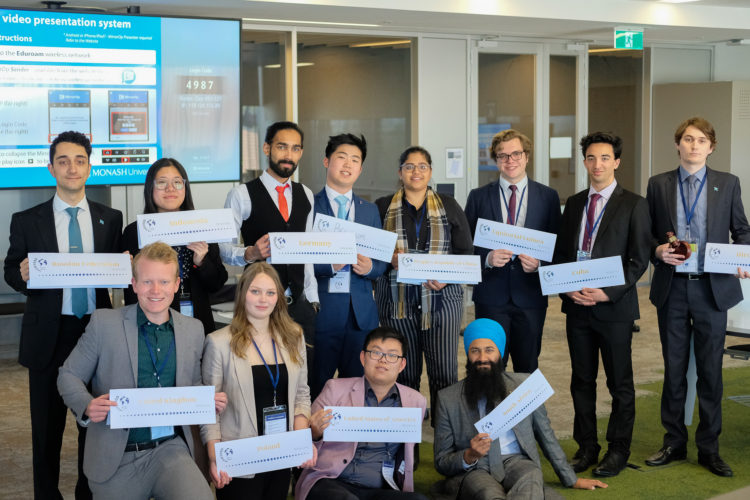United Nations Security Council

Topic: The India-China Border Dispute
The escalating tensions surrounding the region of the disputed Himalayan border have been flared through the recent physical confrontation in mid-June this year, along the Ladakh area of Kashmir. The committee will address this territorial conflict between China and India which was apparent from 1967. Following the India-China war over this contested Himalayan border, a fragile truce has been formed through the de facto boundary, referred to as the Line of Actual Control. [Read More]
Crisis Council
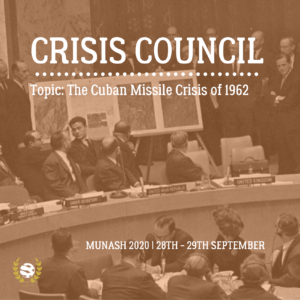
Topic: The Cuban Missile Crisis of 1962
This historical committee will involve the preceding discussions surrounding the Cuban Missile Crisis, in October 1962. The considerations of the opposing powers of the United States and the Soviet Union should be represented by contemplating each administrations’ intentions and ambitions during the Cold War. Delegates will have to ensure their goals are reached during the 13-day confrontation described as the closest that the Cold War had come to escalating into a nuclear war. [Read More]
Human Rights Council
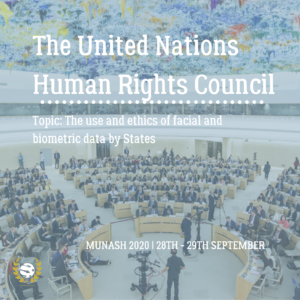
Topic: The use and ethics of facial and biometric data by states
The arrival of ‘big data’ and ever more powerful artificial intelligence learning has allowed states to implement increasing levels of facial recognition. This technology, coupled with advances in genomics and biometrics has increasingly allowed states to build profiles of their citizens. While such technology has usually fallen into the hands of law enforcement, several states are deploying such technologies to target certain sects of their population. The recent BLM protests that have reached many democratic nations have also been a focal point for the inappropriate use of facial/biometric data. [Read More]
Commission on the Status of Women
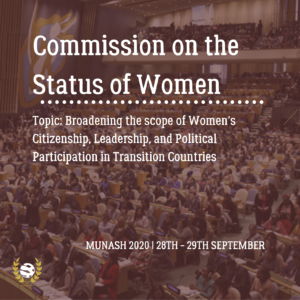
Topic: Broadening the Scope of Women’s Citizenship, Leadership, and Political Participation in Transition Countries
This Commission will discuss the multifaceted hurdles in removing women’s limitations on their leadership and political participation on a local to global level within transition countries. It will aim to tackle developing countries’ specifically, in regards to systematically embedding a promoted inclusion of women in the political sphere. This commission should address the matters of civic education, gender-inclusive sensitization campaigns, electoral violence as well as women’s integration into policy-making. [Read More]
Internet Governance Forum
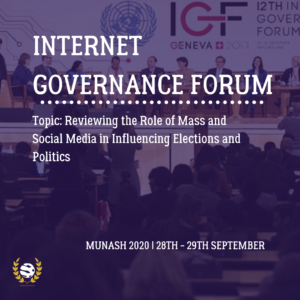
Topic: Reviewing the role of mass and social media in influencing elections and politics
The global usage of mass and social media has exponentially increased since the early 2010s. Today, there are approximately 4.5 billion unique Internet users, with OECD countries on average, having 90% of their populations online. With the increased prevalence of the internet and social media, however, there is increasing concern among many democratic countries that such systems are undermining their democracies. In this committee, delegates will take on the role of either democratic states or a representative for a technology company or advocacy group. [Read More]
Australia-New Zealand National Cabinet

Topic: A COVIDSafe Plan for a Trans-Tasman Travel Bubble
The National Cabinet was established in March 2020 as a response to the arrival of COVID-19 as a way to coordinate a national response with various states and their health systems. In May 2020, it was announced the National Cabinet will supplant COAG and become a formal fixture by which the various premiers of states and the Prime Minister can discuss issues and coordinate policy. Delegates must take into consideration how Australia and New Zealand should navigate the remainder of the COVID-19 crisis with respect to travel. With various interests and risks the National Cabinet, with the assistance of New Zealand, must come to an agreement on a potential ‘travel bubble’. [Read More]

